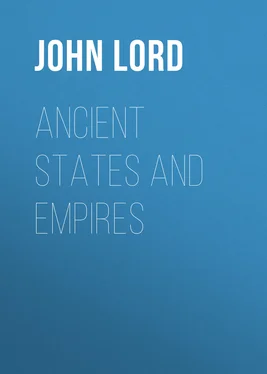John Lord - Ancient States and Empires
Здесь есть возможность читать онлайн «John Lord - Ancient States and Empires» — ознакомительный отрывок электронной книги совершенно бесплатно, а после прочтения отрывка купить полную версию. В некоторых случаях можно слушать аудио, скачать через торрент в формате fb2 и присутствует краткое содержание. Жанр: foreign_prose, История, foreign_edu, foreign_antique, на английском языке. Описание произведения, (предисловие) а так же отзывы посетителей доступны на портале библиотеки ЛибКат.
- Название:Ancient States and Empires
- Автор:
- Жанр:
- Год:неизвестен
- ISBN:нет данных
- Рейтинг книги:4 / 5. Голосов: 1
-
Избранное:Добавить в избранное
- Отзывы:
-
Ваша оценка:
- 80
- 1
- 2
- 3
- 4
- 5
Ancient States and Empires: краткое содержание, описание и аннотация
Предлагаем к чтению аннотацию, описание, краткое содержание или предисловие (зависит от того, что написал сам автор книги «Ancient States and Empires»). Если вы не нашли необходимую информацию о книге — напишите в комментариях, мы постараемся отыскать её.
Ancient States and Empires — читать онлайн ознакомительный отрывок
Ниже представлен текст книги, разбитый по страницам. Система сохранения места последней прочитанной страницы, позволяет с удобством читать онлайн бесплатно книгу «Ancient States and Empires», без необходимости каждый раз заново искать на чём Вы остановились. Поставьте закладку, и сможете в любой момент перейти на страницу, на которой закончили чтение.
Интервал:
Закладка:
Habits of the people.
Polygamy was not common, though concubines were allowed. In the upper classes women were treated with great respect, and were regarded as the equals of men. They ruled their households. The rich were hospitable, and delighted to give feasts, at which were dancers and musicians. They possessed chariots and horses, and were indolent and pleasure-seeking. The poor people toiled, with scanty clothing and poor fare.
Literary culture.
Hieroglyphic writing prevailed from a remote antiquity. The papyrus was also used for hieratic writing, and numerous papyri have been discovered, which show some advance in literature. Astronomy was cultivated by the priests, and was carried to the highest point it could attain without modern instruments. Geometry also reached considerable perfection. Mechanics must have been carried to a great extent, when we remember that vast blocks of stone were transported 500 miles and elevated to enormous heights. Chemistry was made subservient to many arts, such as the working of metals and the tempering of steel. But architecture was the great art in which the Egyptians excelled, as we infer from the ruins of temples and palaces; and these wonderful fabrics were ornamented with paintings which have preserved their color to this day. Architecture was massive, grand, and imposing. Magical arts were in high estimation, and chiefly exercised by the priests. The industrial arts reached great excellence, especially in the weaving of linen, pottery, and household furniture. The Egyptians were great musicians, using harps, flutes, cymbals, and drums. They were also great gardeners. In their dress they were simple, frugal in diet, though given to occasional excess; fond of war, but not cruel like the Assyrians; hospitable among themselves, shy of strangers, patriotic in feeling, and contemplative in character.
CHAPTER V.
THE JEWS UNTIL THE CONQUEST OF CANAAN
Potiphar and Joseph. Elevation of Joseph.
When Joseph was sold by the Midianites to Potiphar, Egypt was probably ruled by the Shepherd kings, who were called Pharaoh, like all the other kings, by the Jewish writers. Pitiphar (Pet-Pha, dedicated to the sun) was probably the second person in the kingdom. Joseph, the Hebrew slave, found favor in his sight, and was gradually promoted to the oversight of his great household. Cast into prison, from the intrigues of Potiphar's wife, whose disgraceful overtures he had virtuously and honorably rejected, he found favor with the keeper of the prison, who intrusted him with the sole care of the prisoners, although himself a prisoner,—a striking proof of his transparent virtue. In process of time two other high officers of the king, having offended him, were cast into the same prison. They had strange dreams. Joseph interpreted them, indicating the speedy return of the one to favor, and of the other to as sudden an execution. These things came to pass. After two years the king himself had a singular dream, and none of the professional magicians or priests of Egypt could interpret it. It then occurred to the chief butler that Joseph, whom he had forgotten and neglected, could interpret the royal dream which troubled him. He told the king of his own dream in prison, and the explanation of it by the Hebrew slave. Whereupon Joseph was sent for, shaven and washed, and clothed with clean raiment to appear in the royal palace, and he interpreted the king's dream, which not only led to his promotion to be governor over Egypt, with the State chariots for his use, and all the emblems of sovereignty about his person—a viceroy whose power was limited only by that of the king—but he was also instrumental in rescuing Egypt from the evils of that terrible famine which for seven years afflicted Western Asia. He was then thirty years of age, 1715 B.C., and his elevation had been earned by the noblest qualities—fidelity to his trusts, patience, and high principle—all of which had doubtless been recounted to the king.
His rule as Viceroy.
The course which Joseph pursued toward the Egyptians was apparently hard. The hoarded grain of seven years' unexampled plenty was at first sold to the famishing people, and when they had no longer money to buy it, it was only obtained by the surrender of their cattle, and then by the alienation of their land, so that the king became possessed of all the property of the realm, personal as well as real, except that of the priests. But he surrendered the land back again to the people subsequently, on condition of the payment of one-fifth of the produce annually (which remained to the time of Moses)—a large tax, but not so great as was exacted of the peasantry of France by their feudal and royal lords. This proceeding undoubtedly strengthened the power of the Shepherd kings, and prevented insurrections.
The famine in Egypt.
The severity of the famine compels the brothers of Joseph to seek corn in Egypt. Their arrival of course, is known to the governor, who has unlimited rule. They appear before him, and bowed themselves before him, as was predicted by Joseph's dreams. But clothed in the vesture of princes, with a gold chain around his neck, and surrounded by the pomp of power, they did not know him, while he knows them. He speaks to them, through an interpreter, harshly and proudly, accuses them of being spies, obtains all the information he wanted, and learns that his father and Benjamin are alive. He even imprisons them for three days. He releases them on the condition that they verify their statement; as a proof of which, he demands the appearance of Benjamin himself.
Benjamin and his brothers. Moses as an historian.
They return to Canaan with their sacks filled with corn, and the money which they had brought to purchase it, secretly restored, leaving Simeon as surety for the appearance of Benjamin. To this Jacob will not assent. But starvation drives them again to Egypt, the next year, and Jacob, reluctantly is compelled to allow Benjamin to go with them. The unexpected feast which Joseph made for them, sitting himself at another table—the greater portions given to Benjamin, the deception played upon them by the secretion of Joseph's silver cup in Benjamin's sack, as if he were a thief, the distress of all the sons of Jacob, the eloquent pleadings of Judah, the restrained tears of Joseph, the discovery of himself to them, the generosity of Pharaoh, the return of Jacob's children laden not only with corn but presents, the final migration of the whole family, to the land of Goshen, in the royal chariots, and the consummation of Joseph's triumphs, and happiness of Jacob—all these facts and incidents are told by Moses in the most fascinating and affecting narrative ever penned by man. It is absolutely transcendent, showing not only the highest dramatic skill, but revealing the Providence of God—that overruling power which causes good to come from evil, which is the most impressive lesson of all history, in every age. That single episode is worth more to civilization than all the glories of ancient Egypt; nor is there anything in the history of the ancient monarchies so valuable to all generations as the record by Moses of the early relations between God and his chosen people. And that is the reason why I propose to give them, in this work, their proper place, even if it be not after the fashion with historians. The supposed familiarity with Jewish history ought not to preclude the narration of these great events, and the substitution for them of the less important and obscure annals of the Pagans.
Prosperity of the Hebrews. Their subsequent miseries.
Joseph remained the favored viceroy of Egypt until he died, having the supreme satisfaction of seeing the prosperity of his father's house, and their rapid increase in the land of Goshen, on the eastern frontier of the Delta of the Nile,—a land favorable for herds and flocks. The capital of this district was On—afterward Heliopolis, the sacred City of the Sun, a place with which Joseph was especially connected by his marriage with the daughter of the high priest of On. Separated from the Egyptians by their position as shepherds, the children of Jacob retained their patriarchal constitution. In 215 years, they became exceedingly numerous, but were doomed, on the change of dynasty which placed Ramesis on the throne, to oppressive labors. Joseph died at the age of 110—eighty years after he had become governor of Egypt. In his latter years the change in the Egyptian dynasty took place. The oppression of his people lasted eighty years; and this was consummated by the cruel edict which doomed to death the infants of Israel; made, probably, in fear and jealousy from the rapid increase of the Israelites. The great crimes of our world, it would seem, are instigated by these passions, rather than hatred and malignity, like the massacre of St. Bartholomew and the atrocities of the French Revolution.
Читать дальшеИнтервал:
Закладка:
Похожие книги на «Ancient States and Empires»
Представляем Вашему вниманию похожие книги на «Ancient States and Empires» списком для выбора. Мы отобрали схожую по названию и смыслу литературу в надежде предоставить читателям больше вариантов отыскать новые, интересные, ещё непрочитанные произведения.
Обсуждение, отзывы о книге «Ancient States and Empires» и просто собственные мнения читателей. Оставьте ваши комментарии, напишите, что Вы думаете о произведении, его смысле или главных героях. Укажите что конкретно понравилось, а что нет, и почему Вы так считаете.







